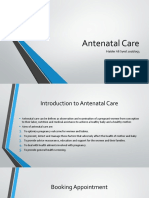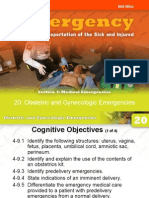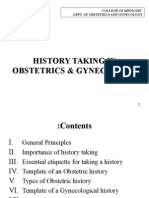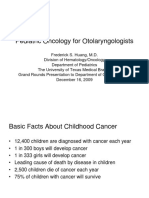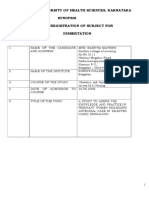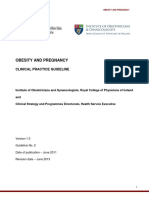0 ratings0% found this document useful (0 votes)
124 viewsAntenatal Care
Antenatal Care
Uploaded by
Justine NyangaresiThis document outlines the objectives and components of focused antenatal care (FANC). FANC recommends a minimum of four comprehensive antenatal care visits. The objectives of FANC are early detection of problems, prevention of complications, birth preparedness, health promotion, and care by a skilled attendant. Each visit has specific purposes, such as obtaining medical history, examinations, tests, treatments, counseling, and health education. The four visits are recommended to take place at different gestational ages with the content tailored for the stage of pregnancy.
Copyright:
© All Rights Reserved
Available Formats
Download as PPTX, PDF, TXT or read online from Scribd
Antenatal Care
Antenatal Care
Uploaded by
Justine Nyangaresi0 ratings0% found this document useful (0 votes)
124 views14 pagesThis document outlines the objectives and components of focused antenatal care (FANC). FANC recommends a minimum of four comprehensive antenatal care visits. The objectives of FANC are early detection of problems, prevention of complications, birth preparedness, health promotion, and care by a skilled attendant. Each visit has specific purposes, such as obtaining medical history, examinations, tests, treatments, counseling, and health education. The four visits are recommended to take place at different gestational ages with the content tailored for the stage of pregnancy.
Original Description:
antenatal care slides.
Original Title
Anc
Copyright
© © All Rights Reserved
Available Formats
PPTX, PDF, TXT or read online from Scribd
Share this document
Did you find this document useful?
Is this content inappropriate?
This document outlines the objectives and components of focused antenatal care (FANC). FANC recommends a minimum of four comprehensive antenatal care visits. The objectives of FANC are early detection of problems, prevention of complications, birth preparedness, health promotion, and care by a skilled attendant. Each visit has specific purposes, such as obtaining medical history, examinations, tests, treatments, counseling, and health education. The four visits are recommended to take place at different gestational ages with the content tailored for the stage of pregnancy.
Copyright:
© All Rights Reserved
Available Formats
Download as PPTX, PDF, TXT or read online from Scribd
Download as pptx, pdf, or txt
0 ratings0% found this document useful (0 votes)
124 views14 pagesAntenatal Care
Antenatal Care
Uploaded by
Justine NyangaresiThis document outlines the objectives and components of focused antenatal care (FANC). FANC recommends a minimum of four comprehensive antenatal care visits. The objectives of FANC are early detection of problems, prevention of complications, birth preparedness, health promotion, and care by a skilled attendant. Each visit has specific purposes, such as obtaining medical history, examinations, tests, treatments, counseling, and health education. The four visits are recommended to take place at different gestational ages with the content tailored for the stage of pregnancy.
Copyright:
© All Rights Reserved
Available Formats
Download as PPTX, PDF, TXT or read online from Scribd
Download as pptx, pdf, or txt
You are on page 1of 14
Antenatal Care
Session Objectives
By the end of the session participants will be able to:-
• Describe Focused Antenatal Care
• Discuss the importance of the 4 ANC visit model
• Describe the care given at each ANC Visit
What is Antenatal care?
• Antenatal Care is health care given to a pregnant
women from conception to the onset of labour.
Focused Antenatal Care (FANC)
• FANC is an ANC approach that recommends a
minimum number of four comprehensive
personalized antenatal visits, each of which has
specific objectives
Objectives of focused antenatal Care
• Early detection and treatment of problems
• Prevention of complications using safe,
simple and cost-effective interventions
• Birth preparedness and complication
readiness
• Health promotion using health messages and
counselling
• Provision of care by a skilled attendant
Recommended visit schedules
1st visit 2nd visit 3rd visit 4th visit
Kenya National Guidelines <16 weeks 16-28 28-32 32-40
for Quality Obstetrics and weeks weeks weeks
Perinatal Care
World Health Organisation 8-12 24-26 32 weeks 36-38
guidelines weeks weeks weeks
The 4 visit model is the minimum recommended
number of visits, more may be required.
Purpose of ANC booking
• The purpose of the initial ANC booking visit is to
classify women for basic ANC (four visits) or more
specialized care at every visit.
• Those with “normal” Pregnancy will usually be
triaged for the four basic FANC visits.
• Follow up of women already exhibiting pregnancy
complications is adjusted according to management
requirements.
What is ‘Normal Pregnancy’?
• ‘Normal’ or ‘low-risk pregnancy’ is one where
women do not have any medical or obstetric risk
factors before the onset of labour. These include:
– complications with previous pregnancies
– complications during their current pregnancy
– Medical conditions
First Visit
• Establish a friendly atmosphere
• Obtain personal, obstetric and medical history.
• Confirm pregnancy and EDD.
• Complete general and obstetrical examination.
• Do Antenatal Profile
• Give tetanus toxoid, anti-malarial treatment,
Mebendazole, iron and folic acid as per guidelines.
• Health education including safe sex, sleeping under ITN,
birth and emergency plan (involve partner); nutrition, etc.
• Document in mother child booklet / ANC register
• Re-schedule the next visit.
2nd ANC Visit
• Note any changes in personal circumstances since
first visit
• Assess maternal and foetal well-being.
• Exclude Pregnancy induced hypertension and
anaemia.
• Review and modify birth and emergency plan.
• Counsel and educate accordingly
3rd ANC visit
As for second visit plus:
• Exclude any other complications e.g. multiple
pregnancies
• Counsel on infant feeding, birth spacing and
importance of postpartum visit.
4th ANC visit
As for third visit plus:
• Re-assess for complications e.g. Malpresentation and
possible referral
• NOTE:
– Routine pelvic examination has not been found to
be beneficial.
Documentation and missed ANC visits
• Remember to complete all records and to advise
women to bring ANC records to all appointments
with any health services.
• Ensure activities for missed ANC visits are carried
out at the next opportunity.
Summary
Any Questions?
You might also like
- Project Proposal On Child Nutrition For Sustainable Health and Prenatal ClinicDocument6 pagesProject Proposal On Child Nutrition For Sustainable Health and Prenatal Clinicczeremar chan100% (4)
- SOAPIEDocument34 pagesSOAPIEEm Castillo100% (2)
- Seminar On Skilled Birth SBA ModuleDocument50 pagesSeminar On Skilled Birth SBA ModuleSangita Patir83% (40)
- FB Aspir Slides 090225Document53 pagesFB Aspir Slides 090225Justine NyangaresiNo ratings yet
- SBAs and EMQs For MRCOG II Addressing The New Exam Format2Document460 pagesSBAs and EMQs For MRCOG II Addressing The New Exam Format2Hasan Dahamsheh92% (13)
- Anc For C1Document41 pagesAnc For C1Henok Y KebedeNo ratings yet
- Ante-Natal CareDocument17 pagesAnte-Natal Carefalodun miracleNo ratings yet
- Maternal Health ServicesDocument24 pagesMaternal Health ServicesMuna Hassan MustafaNo ratings yet
- ANC For C1Document65 pagesANC For C1Natif BoteNo ratings yet
- Antenatal Care: Dawit M. (MD, OBGYN)Document65 pagesAntenatal Care: Dawit M. (MD, OBGYN)sirgute tamratNo ratings yet
- Antenatal care-1Document42 pagesAntenatal care-1Joshua mwambaNo ratings yet
- Chapter Four: Maternal Health ServicesDocument51 pagesChapter Four: Maternal Health Servicesfiranbon negeraNo ratings yet
- 2a Quality Antenatal CareDocument15 pages2a Quality Antenatal CareVinod BharatiNo ratings yet
- ANC2Document33 pagesANC2JoebestNo ratings yet
- Nursing Management of PregnancyDocument69 pagesNursing Management of PregnancyNANDHININo ratings yet
- Mother Child HealthDocument62 pagesMother Child HealthTauseef AhmadNo ratings yet
- FM - K36 - Prenatal CareDocument33 pagesFM - K36 - Prenatal CareNatasya Ryani Purba100% (1)
- Lecture On Antenatal Care For Third Year Health Officer StudentsDocument49 pagesLecture On Antenatal Care For Third Year Health Officer StudentsBrex SuppNo ratings yet
- © 2015 American College of PhysiciansDocument70 pages© 2015 American College of PhysiciansAriyoko PatodingNo ratings yet
- Midwifery Care ProcesssDocument23 pagesMidwifery Care Processschalaabdisa138No ratings yet
- Roles of A MidwifeDocument23 pagesRoles of A MidwifeAnania EmmanuelNo ratings yet
- Antenatal Care (ANC)Document77 pagesAntenatal Care (ANC)tareNo ratings yet
- Antenatal CareDocument6 pagesAntenatal CareOthmaen Parec Jr.No ratings yet
- Maternal and Child Health Nursing, Focused Antenatal CareDocument22 pagesMaternal and Child Health Nursing, Focused Antenatal Carefestusoluwaseyi4No ratings yet
- Care of Mother, Child, and Adolescent: Prepared by Donna Belle Sumugat RN ManDocument26 pagesCare of Mother, Child, and Adolescent: Prepared by Donna Belle Sumugat RN ManLaurence Docog100% (1)
- PC-BSC-N 1st YearDocument6 pagesPC-BSC-N 1st YearrithushivaNo ratings yet
- Junior Gynecology Rotation ObjectivesDocument13 pagesJunior Gynecology Rotation ObjectivesaaaaaNo ratings yet
- Antenatal Care and Postnatal CareDocument10 pagesAntenatal Care and Postnatal Carekibetjavan15No ratings yet
- Midwifery NursingDocument96 pagesMidwifery NursingMATTHEW KIRARITNo ratings yet
- Session 4 Providing PNC To Mother and Infant - 101428Document78 pagesSession 4 Providing PNC To Mother and Infant - 101428mayembahaward95No ratings yet
- Antenatal Care ScheduleKEM Hosp AUSTRAliaDocument20 pagesAntenatal Care ScheduleKEM Hosp AUSTRAliamill86No ratings yet
- Diagnosis of Pregnancy & Focussed Antenatal CareDocument29 pagesDiagnosis of Pregnancy & Focussed Antenatal CareHomeground entertainmentNo ratings yet
- Unit 3.3 Safe Motherhood Doc (1-5)Document5 pagesUnit 3.3 Safe Motherhood Doc (1-5)mahesh thapaNo ratings yet
- TIPTOP CDI LRP Mod01 ANCRKDocument52 pagesTIPTOP CDI LRP Mod01 ANCRKEditaNo ratings yet
- Àntenatal Care 2021 BSCDocument89 pagesÀntenatal Care 2021 BSCJONES MUNANo ratings yet
- Nursing Care in PregnancyDocument52 pagesNursing Care in Pregnancykuruvagadda sagarNo ratings yet
- NCLCHN1 Clinic and Home VisitDocument28 pagesNCLCHN1 Clinic and Home Visitmelitonfred22No ratings yet
- Multiple Pregnancy: Implementing NICE GuidanceDocument21 pagesMultiple Pregnancy: Implementing NICE GuidancephyxiouzNo ratings yet
- Auxiliary Nurse Midwife (District Hospital)Document21 pagesAuxiliary Nurse Midwife (District Hospital)subash1633No ratings yet
- Abortion, Anc, and CS: Focus+ Lecture SeriesDocument24 pagesAbortion, Anc, and CS: Focus+ Lecture SeriesTianah davisNo ratings yet
- Antenatal Care & Preconception CounsellingDocument73 pagesAntenatal Care & Preconception CounsellingArwa QishtaNo ratings yet
- Routine PNC (Post Natal Care) : What, When, Where and Who? What Is Routine PNC?Document4 pagesRoutine PNC (Post Natal Care) : What, When, Where and Who? What Is Routine PNC?Dex Aiiu SuryaNo ratings yet
- Standards For Competence For Registered MidwivesDocument14 pagesStandards For Competence For Registered MidwivescarNo ratings yet
- Antenatal Care: Haider Ali Syed 2016/053Document16 pagesAntenatal Care: Haider Ali Syed 2016/053Arhum SiddiqiNo ratings yet
- Women Centered Care: Implementation of CenteringPregnancy® in The NetherlandsDocument21 pagesWomen Centered Care: Implementation of CenteringPregnancy® in The NetherlandsAurora GarciaNo ratings yet
- Antenatal Care AduanaDocument36 pagesAntenatal Care AduanalaarnieNo ratings yet
- 3 Antenatal CareDocument24 pages3 Antenatal CareDrSabah Lotfy100% (1)
- Routine Antenatal Care For Healthy Pregnant WomenDocument44 pagesRoutine Antenatal Care For Healthy Pregnant Womenewo jatmikoNo ratings yet
- Chapter 20Document52 pagesChapter 20api-3743202No ratings yet
- Antenatl Intranatal & Postnatal Care. Chn-IIDocument37 pagesAntenatl Intranatal & Postnatal Care. Chn-IIAnwar Ali MalikNo ratings yet
- Mch2anc 210224075325Document50 pagesMch2anc 210224075325mukesh.gandhari.kNo ratings yet
- Afp - StudentDocument175 pagesAfp - Studentissac mahuguNo ratings yet
- Anc CareDocument47 pagesAnc CareasdfNo ratings yet
- FANC JobAid Malawi enDocument4 pagesFANC JobAid Malawi enCakama MbimbiNo ratings yet
- Antenatal CareDocument19 pagesAntenatal CareIshika RoyNo ratings yet
- Antenatal CareDocument70 pagesAntenatal Careabuhajerah15No ratings yet
- 2016.07.18 Pediatrics PREVENTIVE PEDIATRIC HEALTH CARE PDFDocument115 pages2016.07.18 Pediatrics PREVENTIVE PEDIATRIC HEALTH CARE PDFRjDNo ratings yet
- Preconception Counseling Panel FRAYNE FinalDocument22 pagesPreconception Counseling Panel FRAYNE FinalDiahNo ratings yet
- Routine Antenatal Care For Healthy Pregnant Women: Understanding NICE GuidanceDocument24 pagesRoutine Antenatal Care For Healthy Pregnant Women: Understanding NICE GuidanceNoer AsNo ratings yet
- Anc Inc PNCDocument29 pagesAnc Inc PNCDrArun SinghNo ratings yet
- 02-History-Taking-In-OBGYN-DrAyman - Copy - PpsDocument26 pages02-History-Taking-In-OBGYN-DrAyman - Copy - PpsSworupKhadkaNo ratings yet
- The Baby-Making Bible: Simple steps to enhance your fertility and improve your chances of getting pregnantFrom EverandThe Baby-Making Bible: Simple steps to enhance your fertility and improve your chances of getting pregnantNo ratings yet
- The Colleges of Medicine of South AfricaDocument4 pagesThe Colleges of Medicine of South AfricaJustine NyangaresiNo ratings yet
- The Colleges of Medicine of South AfricaDocument7 pagesThe Colleges of Medicine of South AfricaJustine NyangaresiNo ratings yet
- The Colleges of Medicine of South AfricaDocument4 pagesThe Colleges of Medicine of South AfricaJustine NyangaresiNo ratings yet
- The Colleges of Medicine of South AfricaDocument6 pagesThe Colleges of Medicine of South AfricaJustine NyangaresiNo ratings yet
- The Colleges of Medicine of South Africa: FCORL (SA) FinalDocument6 pagesThe Colleges of Medicine of South Africa: FCORL (SA) FinalJustine NyangaresiNo ratings yet
- The Colleges of Medicine of South AfricaDocument4 pagesThe Colleges of Medicine of South AfricaJustine NyangaresiNo ratings yet
- Ent MCQSDocument18 pagesEnt MCQSJustine Nyangaresi100% (2)
- HIV Head Neck Pic 1010 10Document25 pagesHIV Head Neck Pic 1010 10Justine NyangaresiNo ratings yet
- DiverticulumZenk Slides 100428Document30 pagesDiverticulumZenk Slides 100428Justine NyangaresiNo ratings yet
- Superior Canal Pic 2010 09Document19 pagesSuperior Canal Pic 2010 09Justine NyangaresiNo ratings yet
- Surgical Management of Obstructive Sleep Apnea in AdultsDocument30 pagesSurgical Management of Obstructive Sleep Apnea in AdultsJustine NyangaresiNo ratings yet
- Pedi Lymphnode Slides 090924Document56 pagesPedi Lymphnode Slides 090924Justine NyangaresiNo ratings yet
- Ped Onc For ENT 091216Document28 pagesPed Onc For ENT 091216Justine NyangaresiNo ratings yet
- Clinical Otology: Balasubramanian ThiagarajanDocument58 pagesClinical Otology: Balasubramanian ThiagarajanJustine NyangaresiNo ratings yet
- Neonatal SepsisDocument20 pagesNeonatal SepsisJustine Nyangaresi100% (1)
- Procedure For Tracheostomy DecannulationDocument6 pagesProcedure For Tracheostomy DecannulationJustine NyangaresiNo ratings yet
- ENT Online BookDocument63 pagesENT Online BookJustine NyangaresiNo ratings yet
- Neonatal JaundiceDocument12 pagesNeonatal JaundiceJustine NyangaresiNo ratings yet
- Partograph Case StudiesDocument8 pagesPartograph Case StudiesJustine NyangaresiNo ratings yet
- Gandhi University of Health Sciences, Karnataka Synopsis For Registration of Subject For DissertationDocument16 pagesGandhi University of Health Sciences, Karnataka Synopsis For Registration of Subject For DissertationNaman MishraNo ratings yet
- Accomplishment Report 2020Document6 pagesAccomplishment Report 2020Jaileen BatiancilaNo ratings yet
- CLINICSDocument24 pagesCLINICSsonali mewarNo ratings yet
- Antenatal Care & ManagementDocument23 pagesAntenatal Care & ManagementPabhat Kumar100% (2)
- NHMS2016ReportVolumeII MaternalChildHealthFindingsv2Document276 pagesNHMS2016ReportVolumeII MaternalChildHealthFindingsv2TaufiqNo ratings yet
- Research Paper On Birth Preparedness and Complication ReadinessDocument10 pagesResearch Paper On Birth Preparedness and Complication ReadinesswlyxiqrhfNo ratings yet
- Prenatal CareDocument40 pagesPrenatal CareREVATHI H KNo ratings yet
- Andi Alya Nabila (Anc, Inc, PNC)Document58 pagesAndi Alya Nabila (Anc, Inc, PNC)adelacalistaaNo ratings yet
- Obesity and PregnancyDocument39 pagesObesity and PregnancyxxdrivexxNo ratings yet
- Extension of Review Date: Translating Evidence Into Best Clinical PracticeDocument39 pagesExtension of Review Date: Translating Evidence Into Best Clinical PracticeEvan SaapNo ratings yet
- Importance of Prenatal CareDocument12 pagesImportance of Prenatal CarePinkymekala HasanparthyNo ratings yet
- Maternal Health Program - Intro and Micronutrient SupplDocument55 pagesMaternal Health Program - Intro and Micronutrient SupplBianca Nicole Gacad FernandezNo ratings yet
- Sangandiwa PaperDocument52 pagesSangandiwa PaperJoseph RosalNo ratings yet
- Jurnal INT 5Document8 pagesJurnal INT 5Ratu Delima PuspitaNo ratings yet
- Antenatal & Postnatal Care: 1. General InformationDocument7 pagesAntenatal & Postnatal Care: 1. General InformationanishnithaNo ratings yet
- ANC and PNC National Guideline-V3 15th Dec-Edited by DR Bhaba (2) FinalDocument73 pagesANC and PNC National Guideline-V3 15th Dec-Edited by DR Bhaba (2) FinalSweta ManandharNo ratings yet
- MAPEHDocument64 pagesMAPEHAnonymous jepHM5y100% (2)
- 806 2366 2 PBDocument14 pages806 2366 2 PBmutiara syifaNo ratings yet
- Prenatal CareDocument2 pagesPrenatal CareMikaela Carisse F. BalbonNo ratings yet
- Antenatal Care During Pregnancy PamphletDocument2 pagesAntenatal Care During Pregnancy PamphletKatherina NaguiNo ratings yet
- The Initial Prenatal Assessment and Routine Prenatal CareDocument16 pagesThe Initial Prenatal Assessment and Routine Prenatal Carelacminhhien100% (1)
- Nlex 1Document4 pagesNlex 1Aileen AlphaNo ratings yet
- Clinical Pathway Group Reports f145fDocument147 pagesClinical Pathway Group Reports f145fHasyim PurwadiNo ratings yet
- Basic Antenatal Care Handbook ISBNDocument59 pagesBasic Antenatal Care Handbook ISBNAuliamusy100% (2)
- FNCP SampleDocument2 pagesFNCP SampleLouise OpinaNo ratings yet
- Antenatal Assssment Final @@Document46 pagesAntenatal Assssment Final @@Pragati Bhole100% (1)
- Trends in The Midwifery and Obstetrical NursingDocument26 pagesTrends in The Midwifery and Obstetrical NursingNilakshi Barik Mandal92% (12)
- Maternal & Child Health Nursing - Care of The Childbearing & Childrearing FamilyDocument292 pagesMaternal & Child Health Nursing - Care of The Childbearing & Childrearing FamilyFlorence GuerraNo ratings yet











































